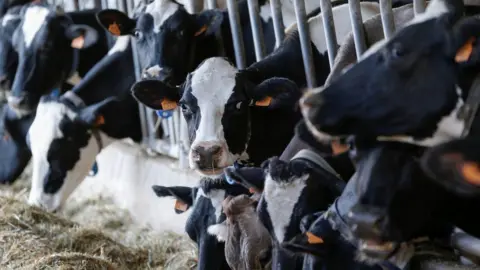New records system for NI livestock delayed and £6m over budget
 Reuters
ReutersA new livestock industry records system is taking more than five years longer to deliver and costing an extra £6m.
Delays in implementing a new £64m system means nearly half its 12-year operating period has been lost, said the Northern Ireland Audit Office.
It warned the final deadline of 2024 is under pressure after stage one of the project failed to meet its June target.
The new system is due to replace an old one which is operating 16 years past its expiry date.
The Animal Public Health Information System (APHIS) had been due to end in 2008.
The new system - the Northern Ireland Food Animal Information System (NIFAIS) - records real-time information on animal movements and animal health.
That information is needed for managing diseases like bovine tuberculosis.
It is used also to provide assurance to customers and consumers and to verify applications for the Basic Payment Scheme.
 Getty Images
Getty ImagesThe system is managed by the Department of Agriculture, Environment and Rural Affairs (Daera).
The Audit Office report said there were several reasons for the delays, including:
- Daera staff without appropriate skills being assigned to the project
- communications with the supplier breaking down when serious issues arose
The report acknowledges that Daera took action in response to these delays, changing leadership and pausing the project to allow a re-evaluation of the business case.
But doing so added £6m to internal Daera costs.
The out-of-date APHIS system continues to run at an annual cost of £500,000 and cannot be switched off until the NIFAIS is complete.
Northern Ireland's Comptroller and Auditor General Dorinnia Carville welcomed the steps taken by the department but expressed her concern about the length of time that action took.
"The system was due to go live by the end of 2018, but the department's leadership did not respond until 2020 and took another year to get the project up and running again," she said.
She said the lessons emerging from the report had relevance for many other public sector projects.
They showed the vital importance of "appropriate governance and having the right skills and experience in place from the outset" so risks could be quickly identified and managed, she added.
"In the case of the NIFAIS project, not having a modern system in place has resulted in benefits for stakeholders not being realised and staff time not being spent on other departmental work, representing poor value for money for taxpayers."
